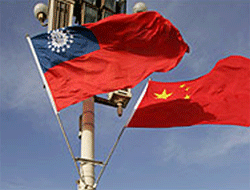The China Factor
A few weeks after the September protests last year in Burma, a Chinese diplomat approached an influential Burmese advocate in New York and asked why the Burmese dubbed their protest the "Saffron Revolution."
 |
In the wake of successful "color revolutions," meaning the victories of nonviolent democracy struggles in post-communist countries, such as Georgia's 2003 Rose Revolution and Ukraine's 2004 Orange Revolution, Beijing is anxious to prevent similar movements at home or among its neighbors.
Then, a country in its backyard triggered the "saffron revolution," and the military's subsequent crack down captured the world’s attention. Along with Burma's crisis, China was drawn into the spotlight in unflattering coverage in international media and diplomatic pressure increased against its support of one of the world's most odious regimes.
Public outcries have called on China to assume larger role in helping to resolve Burma's crisis.
However, contrary to common perceptions, China has a limited sway with the junta’s generals. China is not a patron that pulls the strings and the self-isolated, delusive Burmese regime is not a puppet. The relationship runs in both directions. This is what complicates Burma's problems and their resolution.
Of course, China has more power and influence on the generals than any other country. It also intends to use that leverage to its own benefit.
According to Chinese diplomats, Beijing has been gradually changing its Burma policy since the removal of former Prime Minister Khin Nyut in 2004 and the recent deadly crackdown in Burma. However, they warn that the policy shift should not be expected to be quick or dramatic. It will be slow and well-calculated.
"Than Shwe and Maung Aye are more intransigent than former dictator Ne Win, and they often do incredibly silly things," said a Chinese official during a meeting with a Burmese opposition activist. "China knows that Burma will not prosper under their leadership."
China’s special envoy, Vice Minister of Foreign Affairs Wang Yi, was sent to Burma in November. He met with the junta's top leader, Snr-General Than Shwe, and asked the military "to resolve the pending issues through consultations so as to speed up the democratization process."
However, the regime responded that it will go with its own pace for unilateral implementation of its "Seven-Step Road Map," according to a Western diplomat.
"The Chinese keep telling us that the international community is overstating their influence over Burmese generals," said a European diplomat. "Beijing said they don't have ability to tell the regime what to do."
Aung Kyaw Zaw, a Burmese analyst living on the China-Burma border, disagrees with that interpretation.
"Persuasion, without power backup, will not work. The soft-soft approach should be changed. China must show the ‘stick’ part of its diplomacy," said Aung Kyaw Zaw.
However, Beijing is clearly not ready to go that far. It still believes that working to resolve Burma's problems is secondary to its principal economic and strategic interests in its relationship with the junta.
But simultaneously, China would like to maintain its international role as "a responsible stakeholder."
The time has come for concerted international diplomatic pressure on China to tip the balance toward the “responsible” direction. China must take up Thucydides’ advice: an amoral foreign policy is neither practical nor prudent.
At the same time, the United States and the European Union cannot outsource Burma's democracy reform to China, which itself lacks democracy.
The West’s most powerful countries should coordinate with China to facilitate a real transition in conflict-ridden Burma.
However, diplomacy alone is not enough to compel China to play an effective role.
Public action is needed.
"China was very annoyed to see the wave of protests taking place outside its embassies in major cities of the world in the wake of the September protests," said Aung Kyaw Zaw. "More importantly, they were really worried when demonstrators linked Burma's cause with a 2008 Olympic boycott."
The vice mayor of Beijing warned in October 2007 that any move to link China's role in Burma to a boycott of the 2008 Olympics would be "inappropriate and unpopular." China is very much anxious to prevent any negative effect on the Olympic Games.
1 | 2 next page »
- 'My Wife Died From Police Abuse,' Says Husband
- US Says Observer Conditions Don't Meet Int'l Standards
- 159 Observers to Monitor Burma Election
- Govt to Address Breaches of SSA-South Ceasefire: Aung Min
- Burma Investors Pin Hopes on Seminal Sunday
- Malaysia PM Leads 50-Strong Delegation to Burma
- US Congress to Assess Burma's Political Prisoner Issue
- Rangoon Woman in Police Station Death Plunge
- Burmese Legal System Remains Tool of Govt: AHRC
- Burmese Army Chief Defends Political Role
